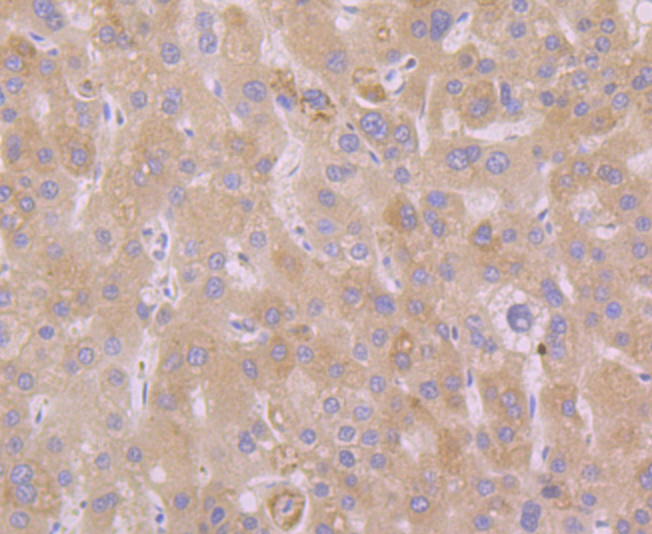Product Name :
Atg12 polyclonal antibody Background :
Atg12 (autophagy-related protein 12), also known as APG12, APG12L, FBR93 or HAPG12, is a 140 amino acid protein that is ubiquitously expressed and belongs to the Atg12 family of proteins. Atg12 is a homolog of the yeast protein Apg12 that participates in autophagy. Autophagy is a membrane trafficking mechanism that delivers cytoplasmic cargo to the vacuole/lysosome for degradation and recycling. In yeast, autophagy requires a protein conjugation system consisting of Apg12 covalently bound at the carboxy terminal glycine to lysine 149 of Apg5. Similarly in humans, Atg12 is essential for autophagy and localizes to the cytoplasm where it is covalently bound to APG5, a conjugation reaction that requires APG7, Atg10 and ATP. The Atg12-APG5 conjugate functions as an important regulator of the autophagic process and is required for the change in membrane morphology and development of autophagosomes. Due to alternative splicing events, two Atg12 isoforms exist. Product :
Rabbit IgG, 1mg/ml in PBS with 0.02% sodium azide, 50% glycerol, pH7.2 Storage&Stability :
Store at +4°C after thawing. Aliquot store at -20°C. Avoid repeated freeze / thaw cycles. Specificity :
Atg12 polyclonal antibody detects endogenous levels of Atg12 protein. Immunogen :
Recombinant protein within human Atg12 aa 1-100. Conjugate :
Unconjugated Modification :
Unmodification
Atg12 polyclonal antibody Background :
Atg12 (autophagy-related protein 12), also known as APG12, APG12L, FBR93 or HAPG12, is a 140 amino acid protein that is ubiquitously expressed and belongs to the Atg12 family of proteins. Atg12 is a homolog of the yeast protein Apg12 that participates in autophagy. Autophagy is a membrane trafficking mechanism that delivers cytoplasmic cargo to the vacuole/lysosome for degradation and recycling. In yeast, autophagy requires a protein conjugation system consisting of Apg12 covalently bound at the carboxy terminal glycine to lysine 149 of Apg5. Similarly in humans, Atg12 is essential for autophagy and localizes to the cytoplasm where it is covalently bound to APG5, a conjugation reaction that requires APG7, Atg10 and ATP. The Atg12-APG5 conjugate functions as an important regulator of the autophagic process and is required for the change in membrane morphology and development of autophagosomes. Due to alternative splicing events, two Atg12 isoforms exist. Product :
Rabbit IgG, 1mg/ml in PBS with 0.02% sodium azide, 50% glycerol, pH7.2 Storage&Stability :
Store at +4°C after thawing. Aliquot store at -20°C. Avoid repeated freeze / thaw cycles. Specificity :
Atg12 polyclonal antibody detects endogenous levels of Atg12 protein. Immunogen :
Recombinant protein within human Atg12 aa 1-100. Conjugate :
Unconjugated Modification :
Unmodification
-
 Western blot analysis of Atg12 on different lysates using anti-Atg12 antibody at 1/500 dilution. Positive control: Lane1: A431 Lane2: Human kidney tissue Lane3: 293T
Western blot analysis of Atg12 on different lysates using anti-Atg12 antibody at 1/500 dilution. Positive control: Lane1: A431 Lane2: Human kidney tissue Lane3: 293T -
 Immunohistochemical analysis of paraffin-embedded human liver cancer tissue using anti-Atg12 antibody. Counter stained with hematoxylin.
Immunohistochemical analysis of paraffin-embedded human liver cancer tissue using anti-Atg12 antibody. Counter stained with hematoxylin.
Bioworld Biotech only provide peptides for our antibodies and do not provide additional peptide customization services.
Price/Size :
USD 368/1mg/vial
Tips:
For phospho antibody, we provide phospho peptide(0.5mg) and non-phospho peptide(0.5mg).Describe :
Blocking peptides are peptides that bind specifically to the target antibody and block antibody binding. These peptide usually contains the epitope recognized by the antibody. Antibodies bound to the blocking peptide no longer bind to the epitope on the target protein. This mechanism is useful when non-specific binding is an issue, for example, in Western blotting (WB) and Immunohistochemistry (IHC). By comparing the staining from the blocked antibody versus the antibody alone, one can see which staining is specific; Specific binding will be absent from the western blot or IHC performed with the neutralized antibody.Formula:
Synthetic peptide was lyophilized with 100% acetonitrile and is supplied as a powder. Reconstitute with 0.1 ml DI water for a final concentration of 10 mg/ml.The purity is >90%,tested by HPLC and MS.
Storage:
The freeze-dried powder is more stable. For short time at 2-8°C. For long term storage store at -20°C.
Note :
This product is for research use only (RUO only). Not for use in diagnostic or therapeutic procedures.
 Atg12 polyclonal antibody
Atg12 polyclonal antibody  Datasheet
Datasheet COA
COA MSDS
MSDS SHIP
SHIP